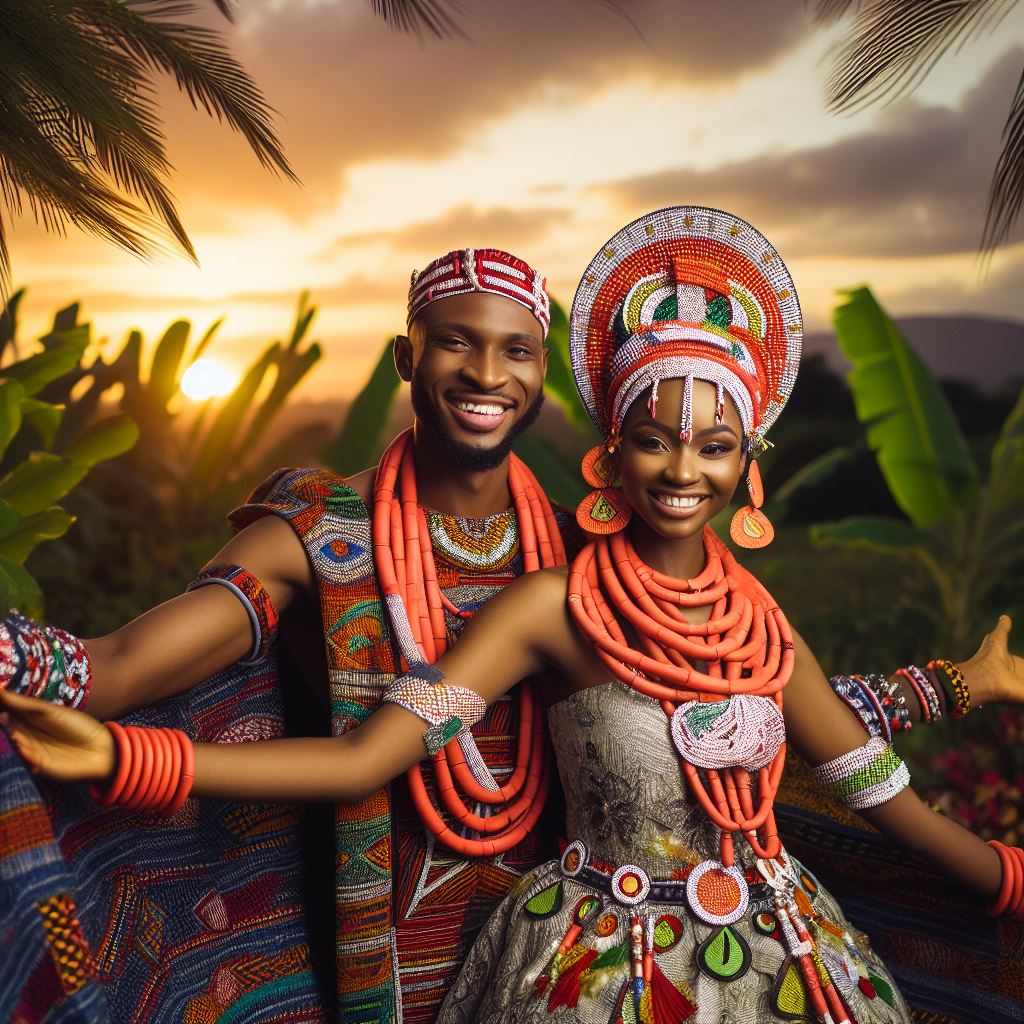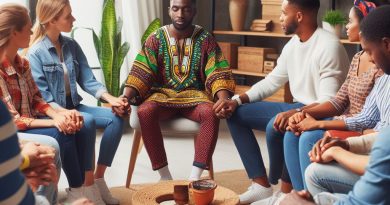Igbo Marriage Rites: From Introduction to Celebration
Last Updated on November 4, 2023
Introduction
Explanation of Igbo culture and traditions
- Igbo culture and traditions are deeply rooted in the history of the Igbo people, who are indigenous to southeastern Nigeria.
- They have a rich heritage that is celebrated through their customs, art, language, and religion.
- Marriage holds a significant place in Igbo society as it is seen as a pivotal event that brings together families and communities.
Importance and significance of marriage in Igbo society
- Marriage is highly valued in Igbo culture due to its importance in preserving lineage, ensuring social stability, and enhancing the economic well-being of families.
- It acts as a bond that brings two individuals together, but also serves as a union between two families. It is a sacred institution that strengthens social ties and fosters a sense of unity and belonging.
- In Igbo society, marriage is not just a legal or social contract between a man and a woman; it is a spiritual union that is often accompanied by various traditional rituals and ceremonies.
- These rituals serve as a means to bless the couple and seek the protection and guidance of ancestral spirits.
- The celebration of marriage in Igbo culture is a vibrant and elaborate affair, filled with music, dance, and feasting.
- It is an occasion for joy and merriment, where friends and family come together to celebrate the newlyweds and shower them with blessings and gifts.
Basically, the Igbo culture and traditions have a profound influence on the way marriage is perceived and celebrated in their society.
It is an institution that goes beyond the union of two individuals and plays a vital role in the social fabric of the community.
Pre-Marriage Stage
- The ‘Introduction’ phase in Igbo marriage is a crucial part of the marriage process. In Igbo culture, courtship and dating are conducted through traditional methods.
- Parents and family members play a significant role in arranging marriages in the Igbo community. Bridewealth, also known as bride price, holds immense importance in Igbo marriages.
- There are various marriage negotiation customs followed in Igbo culture.
Overview of the ‘Introduction’ phase in Igbo marriage
- The ‘Introduction’ phase marks the beginning of the Igbo marriage process. It is a formal introduction of the intending couple to their families and the community.
- This phase involves the groom’s family visiting the bride’s family, with the groom’s father leading the delegation.
- During the introduction, the purpose of the visit is stated, and the bride’s family evaluates the groom’s family and their suitability for the marriage.
- Exchange of gifts and breaking of kolanuts are essential rituals that take place during the introduction.
- If the bride’s family is satisfied with the groom’s family, they give their consent for further proceedings, leading to the next stage.
Traditional methods of courtship and dating
- Courtship and dating in Igbo culture are rooted in the tradition and customs of the community.
- Young men seeking a bride often initiate courtship by sending emissaries to the potential bride’s family.
- These emissaries serve as intermediaries and convey the groom’s intentions to the bride’s family.
- If the bride’s family is interested, they invite the groom and his family for the introduction ceremony.
- Dating is not commonly practiced in the traditional Igbo society, as marriage is considered a long-term commitment.
Role of parents and family in arranging marriages
- In Igbo culture, parents and family members play a vital role in the process of arranging marriages.
- Parents are responsible for seeking suitable partners for their children and ensuring compatibility.
- The decision-making power lies with the parents, as they consider factors like family background, reputation, and social status.
- The involvement of parents and families strengthens the bond between the families and ensures a strong foundation for the marriage.
- The parents’ approval is essential for the success of the marriage and the acceptance of the couple in the community.
Importance of bridewealth (bride price) in Igbo marriages
- Bridewealth, also known as bride price or bride token, holds immense significance in Igbo marriages.
- It is a symbolic payment made by the groom or his family to the bride’s family.
- Bridewealth serves as a sign of respect, gratitude, and appreciation for the bride’s family.
- It also demonstrates the groom’s ability to provide for the bride and contributes to the financial stability of the union.
- The negotiation and payment of bridewealth solidify the marriage agreement and seal the union between the families.
Examples of different marriage negotiation customs
- Igbo culture has various customs and practices when it comes to the negotiation of marriages.
- One common custom is the exchange of drinks and kolanuts during the introduction ceremony.
- Another tradition is the “Iku aka” ceremony, where the groom’s family presents palm wine to the bride’s family.
- In some cases, the bride’s family may demand certain items or gifts as part of the negotiation process.
- The specific customs and practices may vary among different Igbo communities and families.
- These customs highlight the importance of tradition and cultural values in Igbo marriages.
Read: Marriage and Respect: Honouring Your Partner in Everyday Life
Traditional Engagement Ceremony
Description of the ‘Igba Nkwu’ or engagement ceremony
The Igba Nkwu, also known as the engagement ceremony, is a significant event in Igbo marriage rites. It marks the official union between the bride and groom’s families.
Role and responsibilities of the groom’s family
The groom’s family plays a vital role during the engagement ceremony. They are responsible for organizing and financing the entire event.
Role and responsibilities of the bride’s family
On the other hand, the bride’s family also has crucial responsibilities during the engagement ceremony. They prepare the bride for the ceremony, including her traditional attire.
Presentation of gifts, including wine, kola nuts, and traditional attire
- During the engagement ceremony, the groom’s family presents various gifts to the bride’s family. These gifts symbolize their appreciation and commitment to the union.
- Among the gifts presented are wine and kola nuts. Wine signifies joy and good wishes for the couple’s future, while kola nuts represent hospitality and shared communal values.
- Traditional attire is also gifted to the bride and groom during the engagement ceremony. This attire represents their cultural identity and serves as a visual symbol of their union.
Exchange of cultural rituals and customs
- The engagement ceremony is also characterized by the exchange of cultural rituals and customs. These rituals include the breaking of kola nuts and the pouring of libation.
- Another ritual performed during the engagement ceremony is called “Iku aka,” which involves the groom showing his physical strength. This symbolizes his ability to protect and provide for his future bride.
Importance of the ‘Igba Nkwu’ as a public declaration of intention to marry
- The Igba Nkwu holds immense importance as a public declaration of the intention to marry. It announces to the community that the couple is on the path towards marriage.
- Furthermore, the engagement ceremony serves as an opportunity for both families to come together and strengthen their bond. It fosters unity and solidarity among relatives and extended family members.
In essence, the Igba Nkwu or engagement ceremony in Igbo marriage rites is a vibrant and culturally rich event. It involves the active participation of both the groom’s and the bride’s families.
The exchange of gifts, cultural rituals, and customs showcases the values and traditions upheld by the Igbo people.
The importance of the engagement ceremony extends beyond the couple involved, as it symbolizes the union of two families and reinforces community connections.
Read: How Traditional Nigerian Ceremonies Honour the Institution of Marriage

Traditional Wedding Ceremony
Overview of the ‘Igbankwu’ or wedding ceremony
The traditional wedding ceremony, known as ‘Igbankwu,’ is a significant event in Igbo culture. It is a joyous and elaborate celebration that brings families and communities together.
Rituals and customs performed during the ceremony
During the ‘Igbankwu,’ various rituals and customs are performed to signify the union between the bride and groom.
These rituals serve as a way to honor the couple, their families, and ancestors. They also symbolize the community’s blessings and support for the marriage.
Traditional attire for the bride and groom
- One of the highlights of the ceremony is the traditional attire worn by the bride and groom.
- The bride typically wears a beautifully embroidered blouse and wrapper, known as ‘George,’ along with ‘ichafu’ (headgear) and coral beads.
- The groom adorns himself in a matching traditional outfit, which includes a ‘George’ wrapper, a shirt, and a cap.
Traditional Igbo wedding foods and drinks
- Food plays a significant role in Igbo wedding ceremonies. Traditional foods such as ‘obi nono’ (roasted yam), ‘ofe nsala’ (white soup), and ‘ukpaka’ (oil bean) are prepared in abundance.
- These dishes not only represent the richness of Igbo cuisine but also symbolize the couple’s prosperity and abundance in their married life.
- ‘Palm wine’ is the traditional drink of choice during the ceremony, symbolizing joy and happiness.
Importance of music, dance, and storytelling during the ceremony
- Music, dance, and storytelling are integral parts of the ‘Igbankwu.’
- Traditional Igbo musical instruments, such as the ‘ogene’ (metal gong), ‘ikoro’ (wooden slit drum), and ‘ogene udu’ (clay pot with metal rings), are played to create lively and rhythmic tunes.
- Guests and performers engage in energetic dance routines, showcasing the vibrancy and cultural heritage of the Igbo people.
- Additionally, storytelling through proverbs and folktales is used to impart wisdom, moral values, and ancestral knowledge.
Significance of the ‘Igba Nkwu’ and ‘Igbankwu’ in preserving Igbo cultural identity
- The ‘Igba Nkwu’ and ‘Igbankwu’ hold immense significance in preserving Igbo cultural identity.
- These ceremonies serve as platforms for passing down traditions, customs, and values from one generation to the next.
- They provide a sense of continuity and connection to ancestral roots, anchoring the Igbo people in their heritage.
- By actively participating in and upholding these ceremonies, the Igbo community ensures the preservation and promotion of its rich cultural heritage.
In short, the traditional Igbo wedding ceremony, ‘Igbankwu,’ is a celebration filled with rituals, customs, vibrant attire, delicious foods, and lively music and dance.
It symbolizes the union of two individuals while reinforcing the cultural identity of the Igbo people.
The ‘Igba Nkwu’ and ‘Igbankwu’ play a crucial role in preserving Igbo traditions, ensuring their longevity for future generations to embrace and cherish.
Read: Insider Tips: Navigating the Marriage Form Process Effortlessly
Post-Wedding Celebrations
The post-wedding celebrations, also known as the ‘Ikuaka,’ are an integral part of Igbo marriage rites.
This section will explore the description of the ‘Ikuaka’ or post-wedding celebrations, the role of the groom’s family, traditional games, dances, and performances, the significance of the ‘Ikuaka’ in strengthening family ties and bonds, and the symbolism and blessings associated with this joyous event.
Description of the ‘Ikuaka’
- The ‘Ikuaka’ is a grand celebration held after the wedding ceremony to honor and celebrate the newlywed coupleIgbo Marriage Rites: Beauty, Significance, and Cultural Preservation. Explore Pre-Marriage, Wedding Customs, and Celebrations in Nigeria.
- It is a colorful and lively event filled with music, dance, food, and merriment.
- The ‘Ikuaka’ typically takes place at the groom’s family compound.
Role of the Groom’s Family in Hosting the Event
- As hosts of the ‘Ikuaka,’ the groom’s family takes on the responsibility to organize and fund the festivities.
- They invite friends, relatives, and well-wishers from both the bride and the groom’s side.
- The groom’s family takes responsibility for entertaining and caring for everyone during the celebrations, ensuring their well-being
Traditional Games, Dances, and Performances
- The ‘Ikuaka’ is a platform for showcasing traditional Igbo games, dances, and performances.
- Various cultural groups, including masquerade troupes, demonstrate their skills and entertain the guests.
- People play popular games like ‘nkwocha’ (wrestling) and ‘ayo’ (a board game), infusing the celebrations with competitive spirit
Significance of the ‘Ikuaka’ in Strengthening Family Ties and Bonds
- The ‘Ikuaka’ plays a vital role in strengthening family ties and bonds.
- It provides an opportunity for the families of the bride and groom to come together, interact, and develop stronger relationships.
- It fosters unity and solidarity, creating lasting connections that extend beyond the wedding.
Symbolism and Blessings Associated with the Celebration
- The ‘Ikuaka’ is not only a joyous celebration but a symbolic one as well.
- It represents abundance, fertility, and the blessings of a prosperous married life for the newlyweds.
- During the ‘Ikuaka,’ people perform dances, songs, and rituals to invoke blessings from ancestors and gods for a harmonious union
In fact, the post-wedding celebrations, known as the ‘Ikuaka,’ are a vibrant and significant part of Igbo marriage rites.
This section provided a detailed description of the ‘Ikuaka’ celebrations, highlighted the role of the groom’s family as hosts, explored traditional games, dances, and performances, discussed the significance of the event in strengthening family ties, and shed light on the symbolism and blessings associated with the celebration.
The ‘Ikuaka’ is a joyous occasion that brings families together and marks the beginning of a new chapter in the lives of the newlyweds.
Read: Testimonials: Couples Share Their Marriage Form Experiences
Conclusion
Recap of the various stages of Igbo marriage rites
Overall, Igbo marriage rites involve several stages that culminate in a grand celebration.
Throughout this blog section, we have explored the various steps, from introduction to the final marriage ceremony.
Importance of preserving and promoting Igbo culture through marriage customs
It is essential to preserve and promote Igbo culture through these marriage customs. They serve as a reminder of our traditions, heritage, and values.
By carrying on these practices, we keep our culture alive for future generations.
Personal reflection on the beauty and uniqueness of Igbo marriage traditions
Personally, I find the beauty and uniqueness of Igbo marriage traditions captivating. The intricate rituals, vibrant attire, and meaningful symbolism make these ceremonies truly special and memorable.
Encouragement for readers to learn more about different cultural marriage customs in Nigeria.
I encourage readers to learn more about different cultural marriage customs in Nigeria.
By understanding and appreciating these diverse traditions, we can foster cultural exchange and unity among our communities.


